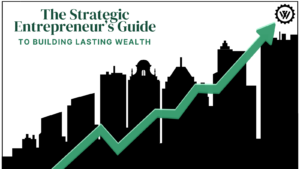As the global consciousness around climate change and environmental responsibility continues to grow, investors are increasingly looking for ways to align their financial strategies with their values. Sustainable investing—whether known as socially responsible investing (SRI), environmental, social, and governance (ESG) investing, or impact investing—has evolved from a niche market into a mainstream approach that combines the pursuit of financial returns with positive social and environmental impact.
If environmental responsibility is part of your Investor DNA, building wealth and making a positive difference can go hand in hand. In this article, we’ll explore how you can align your investments with environmental values without sacrificing financial growth, helping you achieve both Economic Independence and a lasting legacy.
Understanding Sustainable Investing
Sustainable investing isn’t just about avoiding companies that are harmful to the environment. It’s about making intentional choices to support businesses that are leading the way in sustainability. Here’s a breakdown of the key approaches to sustainable investing:
- Negative Screening: This involves excluding companies or entire industries that are harmful to the environment, such as fossil fuels, deforestation, or high carbon emissions.
- Positive Screening: Actively seek out companies that excel in sustainability, whether through renewable energy, innovative waste management, or other eco-friendly practices.
- ESG Integration: Incorporate environmental, social, and governance factors into your overall investment strategy to ensure that your portfolio aligns with your values while still pursuing strong financial returns.
- Impact Investing: Choose investments specifically designed to generate measurable social and environmental impacts alongside financial returns.
The Financial Benefits of Sustainable Investing
A common misconception about sustainable investing is that it might lead to lower returns. However, recent studies have shown that this isn’t necessarily the case. Companies with strong ESG practices often exhibit better risk management, innovation, and resilience, which can lead to superior long-term performance.
Here’s why sustainable investments can be financially rewarding:
- Long-Term Value: Companies that prioritize sustainability tend to manage risks better and capitalize on opportunities that others may overlook, leading to potentially higher long-term returns.
- Consumer Preferences: As consumers increasingly demand sustainable products, companies that lead in environmental responsibility may experience stronger demand, brand loyalty, and profitability.
- Regulatory Incentives: Governments are introducing regulations and incentives to promote sustainable practices, which can benefit companies that are ahead of the curve.
Practical Steps to Build a Sustainable Investment Portfolio
If you’re ready to start aligning your investments with your environmental values, here’s a step-by-step guide to help you get started:
- Find Your Unique Investor DNA: Discovering your Investor DNA involves a deep dive into who you are and what you care about. If you need help getting started, you can get our FREE workbook here.
- Assess Your Current Portfolio: Begin by reviewing your existing investments to identify any holdings that may not align with your environmental values.
- Define Your Values and Goals: Determine which environmental issues are most important to you—whether it’s reducing carbon emissions, supporting renewable energy, or protecting natural resources—and set clear investment goals.
- Research Sustainable Funds and Companies: Look for funds and companies with strong ESG ratings, sustainability indices, and a proven track record of positive environmental impact.
- Consult with Financial Experts: Work with financial advisors who specialize in sustainable investing to create a personalized strategy that aligns with both your values and your financial goals.
- Monitor and Adjust: The field of sustainable investing is dynamic. Regularly review your portfolio to ensure it remains aligned with your values and continues to meet your financial objectives.
Challenges and Considerations
While sustainable investing offers numerous benefits, it’s important to be aware of the challenges:
- Greenwashing: Be cautious of companies that may exaggerate their sustainability efforts to attract investors. Conduct thorough research to ensure your investments are genuinely making a positive impact.
- Performance Volatility: Emerging sectors like renewable energy can be volatile. Understanding the risks involved is crucial for making informed decisions.
- Limited Options in Certain Sectors: Depending on your specific values, you may find fewer investment opportunities in some industries. Balancing your portfolio requires careful consideration.
Building a Wealthy Future with Purpose
Aligning your investments with your environmental values doesn’t mean sacrificing financial growth. In fact, it can enhance your portfolio’s resilience and long-term performance while contributing to a more sustainable world. By adopting a strategic approach to sustainable investing, you can continue your journey toward Economic Independence while making a positive impact on the planet.
Alternative investments such as renewable energy projects represent a real asset and can provide consistent monthly dividends, offer a valuable hedge against inflation and provide true diversification to any investment portfolio.
Our Chief Research Officer, Tom, literally wrote the book on Investor DNA, and he recently shared his knowledge on a webinar with Energea. You can watch the replay here and use it as a chance to sharpen your Investor DNA. Take note of what resonates with you and what doesn’t, and use our “Investor Scorecard” to score the opportunity based on your Investor DNA.
Whether or not you’re keen on renewable energy, the real value here lies in honing your Investor DNA.
And, if you want to learn more about building a sustainable investment portfolio, tap here to see if working with our team of financial experts 1-on-1 is right for you.

